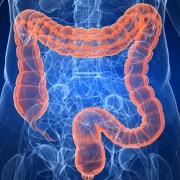Dr. Rakel discusses the principles of a healthy intestinal tract.
Dr. Rakel:
So what we’ll talk about is we’ll kind of go from the top down, if you will, and start with the mind because it’s such an important area of intestinal function that often gets ignored. So when I am stressed my bowels may not move regularly. I might not digest my food as well. So if we have a sense of peace and calm, particularly when we are eating, our GI tract is going to work better. So the mind is the first place to start.
The second one is if we look at the proper pH of the stomach, the normal pH of the stomach is between 1 and 3. We want it there for good digestion. If we suppress acid for too longer period of time we do not allow our bodies to absorb key nutrients and if we have too much acid it can break down the barriers of the stomach and lead to ulcer and erosive changes.
The next is the mucus layer. We all need a healthy mucus layer along the top of the GI tract to allow bacteria to live in and help us absorb nutrients as well as to protect the GI lining.
The next is we go into the small bowel or the top of the bowel tube we don’t want a lot of bacteria there. So in order to keep the bacteria count low in the small, proximal intestine we want a lot of good acid in the stomach that then goes down into the small intestine to keep the bacteria from growing too much.
Then as we travel down through the lower intestine we want a lot of healthy bacteria that allow us to digest food, allow us to maintain a healthy gut-immune barrier so food proteins and other bacteria don’t come across and trigger inflammatory changes that could worsen our health.
And then lastly we want to evacuate on a regular basis. We want good regular evacuation, at least one good luminous stool a day but hopefully maybe even more. We should not go two or three days without a bowel movement so that regularity of our evacuation helps us release toxins and helps us clean out the body and if we do all those things well, if we keep that body and that healthy ecosystem often that will have a positive downward or downstream effects on our health.
About Dr. Rakel, M.D.:
Dr. David Rakel, M.D., attended medical school at Baylor College of Medicine in Houston, Texas, and completed a family practice residency in Greeley, Colorado. He spent the next five years in rural practice as one of two physicians staffing a 14 bed hospital in Driggs, Idaho. As medical director for Grand Targhee Ski resort in Wyoming, he developed an interest in sports medicine and received his Certificate of Added Qualification in 1999.
Dr. Rakel completed a two year fellowship in Integrative Medicine at the University of Arizona from 1999-2001. He joined the University of Wisconsin Department of Family Medicine in 2001 where he teaches and practices, and is the medical director for the University of Wisconsin Health Integrative Medicine. Dave is board certified in family medicine, holistic medicine and sports medicine. He is also certified in Interactive Guided Imagery.
Visit Dr. Rakel at The University of Wisconsin School of Medicine and Public Health





















